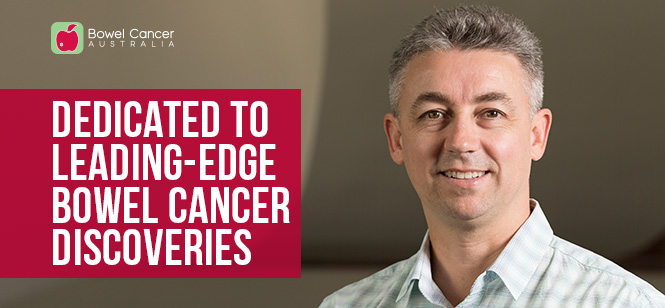Profiling of 60 bowel adenoma polyps will be used to better define optimal colonoscopic surveillance intervals, thanks to a new research grant to the Lawrence Penn Chair of Bowel Cancer Research from the Medical Research Future Fund (Sydney Health Partners).
Professor Mark Molloy, and his collaborators including Professor Alexander Engel from Royal North Shore Hospital will use molecular analysis of bowel polyps to investigate disease risk, seeking to find a signature of transformation risk which could potentially be used to optimise colonoscopy surveillance intervals.
"The research grant provided by the Medical Research Future Fund is exciting as it allows us to trial a pathway for molecular testing of bowel polyps and see if this information can tell us more about a given patient's bowel cancer risk,” said Professor Mark Molloy.
“It may offer an opportunity for more personalised prognosis as we will consider genetic, proteomic and microbiome features of these precancerous growths, which are not currently part of routine pathology testing," he added.
Researchers will use the local health district colonoscopy screening clinic to collect and analyse up to 60 polyps of varying risk levels.
"We will also explore if this molecular information may be useful for guiding follow-up colonoscopy surveillance timing as this would help improve scheduling and costs," Professor Molloy said.

The Lawrence Penn Chair of Bowel Cancer Research
Researching a cure for Australia's second deadliest cancer received a major boost recently with $10.4 million to establish the inaugural Lawrence Penn Chair of Bowel Cancer Research at the University of Sydney, launched in May 2018.
Contributing $6.4 million, Bowel Cancer Australia’s funding expanded Australia's research capacity and we anticipate the Chair will be a game changer for bowel cancer research in this country.
While screening can help with early detection, it won't eliminate bowel cancer. Research is the only way to discover a cure.
The Lawrence Penn Chair of Bowel Cancer Research is named after one of Australia's oldest bowel cancer survivors and is based at the University of Sydney's Northern Clinical School, Royal North Shore Hospital’s Campus.
An endowed professorial chair is recognised as a University's finest scholar in their field of expertise. They provide a research focal point in the country they are located, helping to attract and retain the brightest researchers and spur colleagues to their finest efforts - benefiting the entire Australian community.
Professor Mark Molloy is a biochemist and has developed his expertise in the science of 'proteomics'. He is internationally recognised as an expert in the application of mass spectrometry in biomedical research. Professor Molloy’s focus areas are in translational cancer research, biomarker studies and cell signalling.
The commencement of Professor Molloy as the Lawrence Penn Chair of Bowel Cancer Research is the culmination of many years of hard work.






